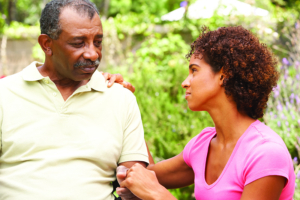Why Are Your Loved One’s Dementia Symptoms Suddenly Getting Worse?

Have a loved one’s dementia symptoms gotten worse all of a sudden? Find out what it might mean here.
Wouldn’t it be helpful if there was an Alzheimer’s care manual, with step-by-step information on what to expect at each stage of the disease? While there are a few general commonalities during the progression of dementia, each person’s experience is different. This makes it difficult to know what to anticipate on any given day.
Even with the unpredictability of Alzheimer’s disease, there are particular situations that are beyond the typical range of expectations to watch for. Perhaps one of the most concerning is a sudden worsening of dementia symptoms. This could occur for many different reasons:
- Delirium, caused by an infection, surgery or a hospital stay, medication side effects, insufficient sleep, dehydration, or even constipation
- Brain injury from a fall or a stroke
- An underlying illness such as cancer or prion disease
- Sundowning
- Disruption to normal routine from a move, change in caregivers, hospitalization, etc.
What Are the Typical Stages of Alzheimer’s Disease?
Alzheimer’s disease is progressive, and as of now, incurable. Therefore, a decline in condition is to be expected. A sudden shift in the person’s condition, however, is atypical. Generally speaking, the disease progresses through the following stages:
- Early: The first detectable signs of Alzheimer’s are typically very mild, including short-term memory lapses, forgetting a word, or getting lost.
- Middle:In the middle stage of the disease, cognitive challenges progress to the point that the individual struggles with independently performing activities of daily living.
- Late:The final stage of Alzheimer’s, which may take years to reach, involves a lack of response and recognition of both people and environment, as the body starts to shut down.
If You Observe Sudden Worsening of Dementia Symptoms…
Seek medical help right away if a sudden decline is noted so that the cause can be pinpointed and addressed.
A dementia care journal can be a very helpful tool, before, during, and after worsening symptoms. Daily journaling can help you keep track of:
- What works and what does not work in helping the person manage challenges
- The person’s overall demeanor on any particular day
- Any difficult behaviors noted, with particulars on time of day and potential triggers or contributing circumstances
- Medications taken and any side effects detected
- Sleeping and eating habits
These kinds of details will be invaluable in helping to piece together what may have caused a rapid change in condition and just how to remedy it.
Responsive Home Care’s caregivers in Plantation, Lighthouse Point, Hollywood, and nearby areas are highly skilled and trained in caring for those diagnosed with dementia and detecting any changes in condition. Contact us online or call us at (954) 486-6440 and let us walk beside you in your dementia care journey.

 Awkwardness. Discomfort. Disbelief. Shame. Each one of these feelings can cycle through a family caregiver’s heart when someone you care about with
Awkwardness. Discomfort. Disbelief. Shame. Each one of these feelings can cycle through a family caregiver’s heart when someone you care about with